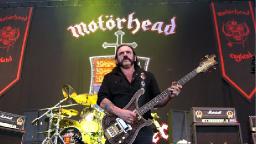How Lemmy and Motorhead Gave Metal Its Umlaut

Lemmy Kilmister , who died December 28th , left an indelible mark on rock & roll. Everything about him — his thunderous singing and songwriting, his drugs-and-smokes lifestyle, even his protruding facial moles — was unapologetic and uncompromising. But just as important, Lemmy and Motörhead left their grammatical mark on rock & roll.
Yes, we're talking about that umlaut — and Lemmy's role in popularizing one of rock's most wonderfully enduring, if sometimes nonsensical, traditions.
Motörhead were, of course, not the first band to stick dots above one or more letters in their name for no practical phonetic reason. In the late Sixties, German proggers Amon Düül were most likely the first to take the umlaut plunge. In 1971, Blue Öyster Cult gave the mark its first brush with mainstream crossover. As original manager and producer Sandy Pearlman told me years ago, he and rock writer Richard Meltzer were talking about the band one day while standing outside a New York restaurant that served up Blue Point oysters. "I said, 'Why don't we call it Blue Oyster Cult?'" Pearlman recalled. "And Richard said, 'And we'll add an umlaut over the "O"!' And I said, 'Great!"'
Several years later, when Lemmy parted ways with psychedelic art-rockers Hawkwind, he initially dubbed his new band Bastard — but ultimately settled on Motorhead, after a song he'd written in Hawkwind (it was also slang for bikers on speed). The crowning touch was the addition of the umlaut over that second "o." "I thought it looked mean," he said a few years ago. "That's the thing, innit?"
Mean, if not gnarly, was indeed the key. In their pre–"(Don't Fear) the Reaper" days, Blue Öyster Cult peppered their image and lyrics with intimations of menace and darkness, especially in songs like "Career of Evil" and "Dominance and Submission." But when it was attached to Motörhead, the umlaut, combined with Lemmy and his bandmates' scraped-raw approach to rock & roll, felt like the real ominous deal, and its repercussions were huge. "I pinched the idea off Blue Öyster Cult," Lemmy said in 2011. "Then Mötley Crüe pinched it off us and it goes on and on."
"I pinched the idea off Blue Öyster Cult. Then Mötley Crüe pinched it off us and it goes on and on." —Lemmy Kilmister
A modest but accurate boast: Rock history is now dotted — literally — with the Crüe, Queensrÿche, Hüsker Dü (not metal, and Swedish for "Do you remember?"), the Accüsed, Green Jellÿ (umlaut used ironically), Spinal Tap (often spelled, for optimum intended hilarity, with the umlaut over the "n"), and Rrröööaaarrr (1986 album by Canadian headbangers Voivod). Even R&B singer Jason Derulo used an umlaut on the cover of his first album, over the "u" in his last name, to help people correctly pronounce his surname.
For Lemmy, though, the umlaut was neither gag nor phonetical necessity. Just as Motorhead's early records injected a faster-louder rush and intensity into Seventies metal, shaking off any arena-rock sludginess that started to creep into the genre, so did the band's umlaut make a statement of its own. The diacritic firmed up metal's edge and identity; it declared that the music would always be a separate, sometimes jarring and rude, universe unto itself. (Lemmy, a collector of Nazi memorabilia, rarely if ever commented on any connection between that umlaut and Nazi-era use of the dots in say, "Führer.") For Lemmy, the umlaut, like the music and lifestyle he lived until his body couldn't take it anymore, spoke — or pronounced — volumes.
Read more: http://www.rollingstone.com/music/news/how-lemmy-and-motorhead-gave-metal-its-umlaut-20151229#ixzz3vjzHMNuH
Tags

A site for local Bands and Musicians world wide to showcase their Audio, Video, Events, Images and more!
















